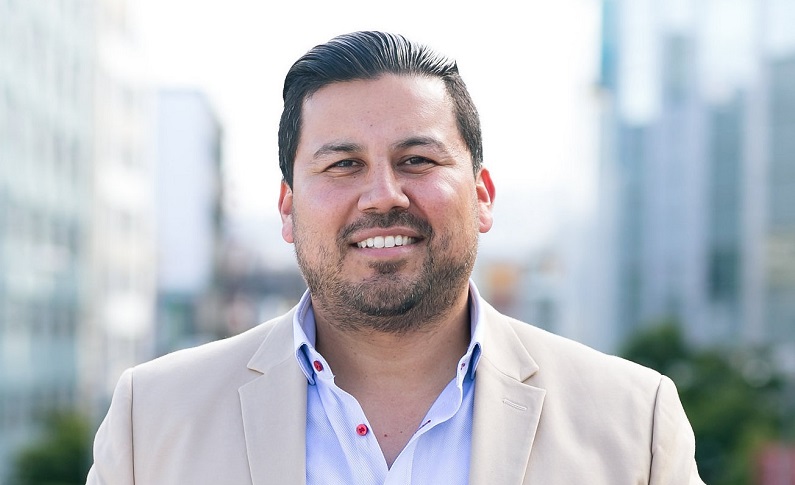
Photo: Alby Bocanegra
Former Mastercard executive sets up as urban futurist
07 December 2022
by Sarah Wray
Alby Bocanegra, who until recently served as Vice President of Urban Technology and Global City Partnerships at Mastercard, has launched a new venture to fill a key gap he sees in municipalities: the need for futurist thinking.
Bocanegra is now founder and Chief Future Officer of The Urban Futurist, a consulting and advisory firm, where he will also be working with private companies on how they can better collaborate with cities.
At Mastercard, Bocanegra led on expanding the City Possible network, which now has over 340 member cities and 50 partners. Prior to that, he spent three years with the Mayor’s Office in the City of New York, mainly as Interim Chief Technology Officer.
Bocanegra told Cities Today: “I’ve spent the better part of a decade studying future technologies and making bets and predictions on the impact they’re going to have and the implications for cities.”
He said cities need to pay closer attention to how to harness emerging technologies to better serve residents as well as how to manage any potential disruption. Preparing the organisation and workforce is also key – a shortage of skilled tech workers is an acute challenge facing cities today – and Bocanegra started his civil service career with the City and County of San Francisco’s Department of Technology where he designed a talent programme.
“If you think about it, most cities don’t have a chief futurist on staff,” he commented. “They’ve got CIOs and CTOs that are being responsive to new technologies and industry, but if you really take a look, there’s no one that’s looking two to five years down the line and being able to spend the time on what the implications are and building strategies and programmes that make them future-ready for technology.”
Mind the gaps
5G is an example of technology getting ahead of cities, according to Bocanegra – a challenge that’s still ongoing.
“When industry started moving to deploy 5G connectivity, there was a gap between how fast industry was moving and how quickly cities were able to respond to it,” he explained. “And then you had this other layer of national or federal governments making decisions that had implications at the local level.
“Having been in it, I can tell you there was a big gap. Having someone thinking about future technology could have helped alleviate that a little bit.”
One of Bocanegra’s first engagements in his new role is working with the Charter Cities Institute, a non-profit focused on charter cities – geographic areas that are granted special jurisdiction to create new governance systems and policy reforms. Examples of the model include Shenzhen, Singapore and Dubai, and the Charter Cities Institute has a particular focus in Latin America and Africa.
“I’m super proud to land that partnership and be able to advise them because when you create charter cities, you have the opportunity to uplift millions of people out of poverty,” said Bocanegra.
As urban populations grow and public services come under pressure: “A charter city creates a second city under the same jurisdiction so you can shift that population,” he said.
“And more than anything, you get to start over and build something from scratch – you get to get it right that second time for people.”
Into the metaverse, onto the blockchain
Bocanegra is also a board member and advisor at Create Labs Ventures, a company working on metaverse and artificial intelligence technologies with a diversity and inclusion focus.
He believes the metaverse is something cities should be paying attention to: “The application that I’m thinking about most is how local governments and public officials can take advantage of that technology to be able to serve residents day or night.”
Blockchain is also in Bocanegra’s sights: “I think that’s going to change the way that cities and people transact in the future. I don’t think about it so much from a cryptocurrency perspective; I’m looking at blockchain technology for smart contracts and ledgers and for people to be able to privately hold all of their documents and information.”
At Mastercard, Bocanegra led the creation of City Possible’s 24-Hour Cities Network and as a DJ in his spare time, he is keen to continue to support cities in maximising and shaping their night-time economies, particularly coming out of the pandemic.
The ‘night mayor’ is an emerging role in cities and Bocanegra notes that strategies to help bars, restaurants and entertainment venues thrive must also encompass action on issues such as transportation and safety.
According to Bocanegra, more cities should consider appointing their own Chief Future Officers.
“I think every major city can benefit from having someone whose full-time job is to think about their city in the future. And that is not just a tech answer: it’s also placemaking, urban development and the economy, as well as preparedness and resilience.
“I don’t want to be the only one.”
City Possible
Other senior figures also departed Mastercard’s City Possible programme earlier this year. Miguel Gamiño, formerly Executive Vice President and Head of Global Cities, joined Silicon Valley start-up Simplicity Tech as Chief Experience Officer and Founding Partner.
Maddie Callis, formerly the Director of City Possible, is now Director of Mastercard’s Localization Program Office.
A spokesperson for Mastercard told Cities Today that Jody Barnett has taken on the lead role of City Possible as Head of Global Cities and Urban Mobility. She has worked at Mastercard for over 17 years, including leading the development of solutions in the cities space since 2019.
The spokesperson said: “City Possible was established four years ago, and in that time the network has rapidly grown from 16 founding members to over 340. Looking ahead, we are committed to keep on expanding the network while continuing to build partnerships and collaboration across the existing members through more direct outreach and communication.
“While our values of inclusion, driving enhanced access to city services, and creating pathways to economic recovery remain the same, we are increasing our focus on urban mobility, data insights and co-created solutions for underserved communities to support cities.”







